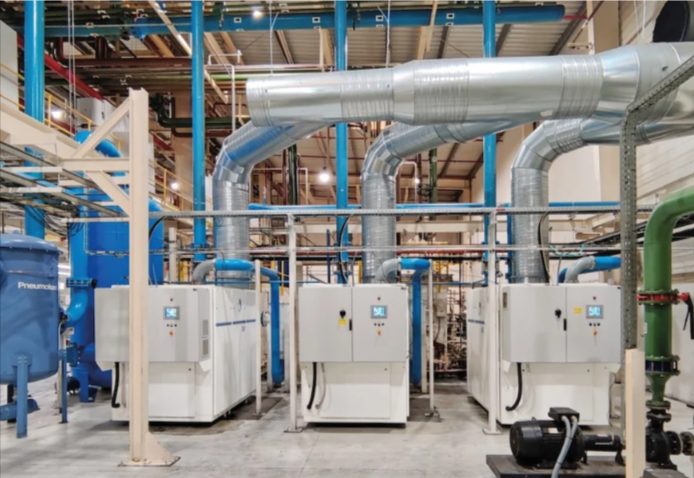

In today’s world, where sustainability and energy efficiency are more critical than ever, industries are finding innovative ways to meet both environmental and financial goals. A perfect example of this is Crown BevCan España.

The Spanish can manufacturer has not only tackled energy consumption but has also demonstrated how a smart retrofit of existing systems can lead to impressive sustainability outcomes. This article dives into how heat recovery technology transformed operations at their Sevilla plant, bringing remarkable energy savings, financial gains, and environmental benefits.
Crown BevCan España, a leader in beverage can production, initially set out to meet its energy efficiency goals with a standard energy-saving setup. In 2020, they installed three Pneumofore UV50 VS90 vacuum pumps. These air-cooled units were specifically selected for their adaptability to the hot Spanish climate, helping the company to reduce its total installed power by 28 per cent, a significant win for energy savings. The new vacuum pumps replaced five older screw pumps with higher energy demands.
Get industry insights from - ALuminium in Packaging: Consumer Trends and Market Dynamics
While the new setup was successful in reducing electric power consumption, Crown BevCan España’s sustainability targets were evolving. The company’s forward-thinking leadership soon realised there was still room for further efficiency improvements.
Unlocking the potential of heat recovery
Vacuum pumps, like air compressors, naturally waste a large portion of the energy they consume as heat. This is a thermodynamic principle; most of the electrical energy absorbed by these machines dissipates as heat. While compressors typically generate more heat due to their higher power usage, vacuum pumps still represent a significant opportunity for energy recovery. This is where the concept of heat recovery came into play.
Rather than letting this heat go to waste, Crown BevCan España saw a golden opportunity to retrofit its vacuum pumps to capture and reuse this waste heat, which could not only improve energy efficiency but also generate long-term cost savings.
The retrofit: turning vision into reality
With this vision in mind, the company embarked on a cutting-edge retrofit project designed to integrate heat recovery into its existing vacuum pump systems. The upgrade involved replacing the original oil/air cooling system with a combined oil/air and oil/water cooling system. This allowed for efficient heat transfer, using water to carry away the excess heat and repurpose it.
The heat exchanger used for this process operated at a temperature range of 26°C to 41°C, efficiently recovering heat from the system. Pneumofore, the supplier of the retrofit kits, prepared all the components in advance, ensuring that the necessary equipment was ready to go. This forward-thinking approach minimised downtime during installation, allowing the plant to continue operations smoothly.
Installed in 2022, the retrofit also included safety features that addressed potential risks such as power failure, cooling interruptions, and system overheating. Despite the complexity of the project, all three UV50 units—only two years old at the time—were successfully retrofitted, one at a time, ensuring minimal disruption to the plant’s operations.
Also Read: Global aluminium cans market set to grow rapidly - consumption expected to reach 627B units by 2030
ROI & results
When the project was initially planned, Crown BevCan España anticipated a two-year return on investment (ROI) to account for the costs of equipment, labour, and installation. However, the results were even better than expected.
Post-installation evaluations revealed that the investment was recouped in just 15 months, significantly ahead of the anticipated timeframe. The recovered thermal energy from the continuous 24/7 operation of the pumps provided measurable and ongoing cost savings, improving overall plant efficiency.
This retrofit not only achieved sustainability goals but also proved that energy recovery can be a highly effective, cost-efficient upgrade. The success of this retrofit demonstrates the potential of heat recovery as a viable solution for other manufacturers looking to reduce their energy consumption and carbon footprint.
A step toward industry-wide change
As more companies seek to reduce their environmental impact, the role of Sustainability Managers and engineers trained in environmental efficiency has become even more crucial. These professionals are at the forefront of assessing energy consumption, identifying improvement opportunities, and making data-driven decisions based on metrics like energy savings, emissions reductions, and ROI.
Crown BevCan España’s project also highlights an important trend: retrofitting existing equipment for better energy efficiency. While many new installations now incorporate heat recovery from the outset, this project shows that it’s not too late for existing systems to undergo transformative upgrades.
Leading the way in sustainable manufacturing
Pneumofore, the company behind the vacuum pumps, is also leading the charge in durable, energy-efficient solutions for the industry. With hundreds of UV50 units in service at can manufacturing plants around the world, Pneumofore continues to innovate and helps companies like Crown BevCan España implement sustainable practices that drive long-term financial and environmental benefits.
This case study serves as a clear example of how the retrofit of existing systems can unlock immediate environmental and economic gains. It proves that energy efficiency and sustainability can go hand in hand with cost-effectiveness, offering an attractive pathway for other companies seeking to enhance their operations without significant new investments.
Crown BevCan España’s successful heat recovery retrofit is more than just an energy-saving initiative; it’s a powerful testament to the value of innovation and smart upgrades in the manufacturing world. The project underscores the importance of looking beyond initial solutions and continuously improving operational efficiency. With the growing shift toward sustainability, this retrofit provides a roadmap for others in the industry to follow, demonstrating that smarter, greener manufacturing is not only possible but also highly beneficial.
Also Read: Crown Holdings doubles down on circularity in new sustainability report
Responses








